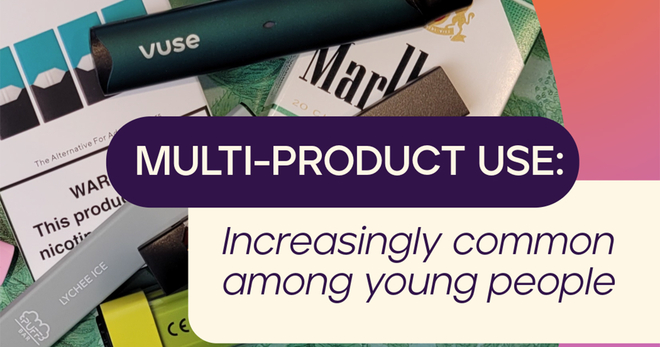Tobacco and baseball have a long, shared history. Is Zyn the latest chapter?
As baseball season gets underway this year, more than half of Major League Baseball’s 30 stadiums are tobacco-free as a result of state and local laws. Yet amid this progress, new oral nicotine pouches such as Zyn are gaining ground among athletes – replacing smokeless tobacco products (like chew, dip, and snus) that players have used historically.
Oral nicotine pouches from brands like Zyn, Rouge, On!, and Velo have exploded in popularity nationwide, with unit sales increasing by six-fold between 2019 and 2022. Philip Morris International, one of the largest tobacco companies and producers of Zyn, recently announced that its shipments of Zyn nicotine pouches rose nearly 80% in the first quarter of 2024. Nicotine concentrations are rising, too: sales of pouch products containing higher concentrations increased more rapidly than those with lower concentrations between 2019 and 2022.
Although some baseball players claim that they are using oral nicotine pouches as a tool to quit smokeless tobacco, which has a long history with the sport, the FDA has not authorized the sale of any oral nicotine pouch product, including Zyn, for help with quitting. When athletes use these products on the field or during interviews, they are acting as unpaid spokespeople for the tobacco industry – which could influence young fans.

Most importantly, use of these products among teens and young adults should be closely monitored. Extensive youth-appealing promotion of oral nicotine pouches on social media, and a growing online subculture surrounding Zyn, raises concerns about youth exposure to these products – and harkens back to e-cigarette manufacturers like JUUL who relied on word-of-mouth, influencer-led marketing to recruit young customers. As oral nicotine products continue to rise in popularity and grab media attention, more research is needed to understand their health implications and potential role in youth nicotine addiction.
What are oral nicotine pouches?
ZYN Nicotine Pouches
Sometimes referred to as a "lip pillow" or "upper decky" because of where they are placed under the upper lip, oral nicotine pouches are small pouches containing nicotine and flavors. They are used similarly to snus — a small pouch of shredded tobacco leaf — but unlike snus, they contain synthetic nicotine instead of tobacco leaf. For this reason, oral nicotine pouches are not classified as smokeless tobacco products, and therefore are not subject to the same restrictions on their manufacturing or marketing. Oral nicotine products still contain nicotine, which is addictive and harmful to developing brains.
Players turn to oral nicotine products amid restrictions
Zyn and Baseball
Smokeless tobacco products, such as dip and chewing tobacco, have been popular among baseball players for decades. But starting in 2016, the MLB prohibited new players from using any smokeless tobacco product. Many players supported the ban, especially after the deaths of player Bill Tuttle and coach Tony Gwynn from oral cancer raised awareness about the dangers of using smokeless tobacco.
Still, some players have switched to oral nicotine products such as Zyn, which are not classified as smokeless tobacco and therefore aren’t subject to the restrictions. Because these products are new to the market, their health risks have not yet been studied.
Why is smokeless tobacco use common among baseball players?
Many early baseball players smoked cigarettes off the field but used chewing tobacco while playing. Players soon discovered that chewing tobacco had baseball-specific benefits: It kept the mouth moist with saliva despite the dusty environment, and pitchers used the juice from chewing tobacco to create the notorious spitball, a pitching tactic banned in 1920 in which a pitcher applies saliva to the baseball.
Chewing tobacco eventually faded in popularity among the American public but remained popular on the baseball field, and to this day, smokeless tobacco products — mostly dip and snus — are still associated with the game.
Action is needed to spread awareness and protect young people from nicotine addiction
Health effects of Zyn
As oral nicotine pouches rise in popularity, concerns have been raised that manufacturers are using marketing tactics that mimic those used by e-cigarette companies to attract young people. According to a study in Tobacco Control, advertisements for nicotine pouches often highlight flavors, emphasize the “freedom” of using nicotine pouches, and suggest that they are less harmful than traditional tobacco products – themes that may appeal to youth and young adults.
The top nicotine pouch brands spent nearly $25 million on advertising between 2019 and 2021, with 34.7% of ads placed across entertainment and media outlets, and 9.5% in sports media. Placing ads for nicotine pouches in entertainment and sports channels, like Barstool Sports, “may raise concerns that the nicotine pouch marketing may parallel the traditional tobacco products’ tactics to target vulnerable young population groups,” the authors write.
Regulation is needed to prevent nicotine pouch manufacturers from following the same playbook that cigarette and e-cigarette makers have used to attract young people. As these products gain popularity, special attention should be paid to youth uptake and the potential role that nicotine pouches may play in youth nicotine addiction.
Can oral nicotine pouches help people quit smoking and vaping?
Quitting Zyn
Nicotine pouches can contain high concentrations of nicotine, which can put users at risk of nicotine addiction and can make quitting more challenging. Nicotine addiction is especially harmful for developing brains, and its use during adolescence can disrupt the formation of brain circuits that control attention, learning, and susceptibility to addiction.
For people looking to quit smoking, vaping, or using oral nicotine pouches like Zyn, there are resources to help.
About EX
EX, a free digital quit tobacco program developed with the Mayo Clinic, is the longest running online community where current and former tobacco users gather to support each other. An increasing number of EX users say they are looking to quit Zyn and other oral nicotine pouches. Truth Initiative research shows that just reading through posts on the EX Community can increase success rates among those looking to quit.
Teens and young adults can text “DITCHVAPE” to 88709 and get immediate help
A first-of-its-kind, free and anonymous text messaging program from truth designed to help young people quit vaping has become a resource for over 700,000 young people. The program incorporates messages from others in the same age group who have attempted to or successfully quit vaping nicotine. A randomized clinical trial found that young adults ages 18-24 who used the program had nearly 40% higher odds of quitting compared to a control group. A second clinical trial proved that the program is not only successful in helping young people quit vaping nicotine, but also in ensuring that they don’t later use combustible tobacco products in place of e-cigarettes.
Want support quitting? Join EX Program
By clicking JOIN, you agree to the Terms, Text Message Terms and Privacy Policy.
Msg&Data rates may apply; msgs are automated.
*You'll get daily texts full of advice and support from experts and other quitters just like you. Enter your mobile number to get started. By clicking SUBMIT, I agree I'm cool with receiving emails and texts from truth and agree to the Terms & Conditions. Text STOP to opt-out. Expect texts daily. No purchase necessary. Msg & Data Rates May Apply.
More in emerging tobacco products
Want support quitting? Join EX Program
By clicking JOIN, you agree to the Terms, Text Message Terms and Privacy Policy.
Msg&Data rates may apply; msgs are automated.


